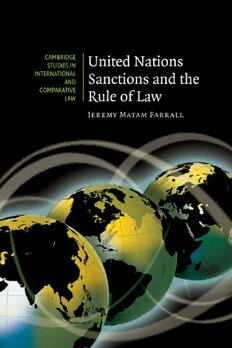
United Nations Sanctions and the Rule of Law PDF
Preview United Nations Sanctions and the Rule of Law
This page intentionally left blank UnitedNationsSanctionsandtheRuleofLaw TheUnitedNationsSecurityCouncilhasincreasinglyresortedto sanctionsaspartofitseffortstopreventandresolveconflict. UnitedNationsSanctionsandtheRuleofLawtracestheevolutionof theSecurityCouncil’ssanctionspowersandchartsthecontours oftheUNsanctionssystem.Italsoevaluatestheextenttowhich theSecurityCouncil’sincreasingcommitmenttostrengthening theruleoflawextendstoitssanctionspractice.Itidentifies shortcomingsinrespectofkeyruleoflawprinciplesand advancespragmaticpolicy-reformproposalsdesignedtoensure thatUNsanctionspromote,strengthenandreinforcetheruleof law.Initsappendices,UnitedNationsSanctionsandtheRuleofLaw containssummariesofalltwenty-fiveUNsanctionsregimes establishedtodatebytheSecurityCouncil.Itformsaninvaluable sourceofreferencefordiplomats,policy-makers,scholarsand advocates. JEREMY MATAM FARRALL isaResearchFellowattheCentrefor InternationalGovernanceandJustice,intheRegulatory InstitutionsNetworkattheAustralianNationalUniversity.He workedfortheUnitedNationsfrom2001to2006,servingasa politicalofficerintheUNSecurityCouncilinNewYork,onthe UNSecretary-General’sMissionofGoodOfficesinCyprusand withtheUNMissioninLiberia.HereceivedhisPh.D.in InternationalLawfromtheUniversityofTasmaniaFacultyof Law,wherehehasalsoworkedasaPostdoctoralResearchFellow. CAMBRIDGE STUDIES IN INTERNATIONAL AND COMPARATIVE LAW Establishedin1946,thisseriesproduceshigh-qualityscholarshipinthefields ofpublicandprivateinternationallawandcomparativelaw.Althoughthese aredistinctlegalsub-disciplines,developmentssince1946confirmtheir interrelation. Comparativelawisincreasinglyusedasatoolinthemakingoflawat national,regionalandinternationallevels.Privateinternationallawisnow oftenaffectedbyinternationalconventions,andtheissuesfacedbyclassical conflictsrulesarefrequentlydealtwithbysubstantiveharmonisationoflaw underinternationalauspices.Mixedinternationalarbitrations,especiallythose involvingstateeconomicactivity,raisemixedquestionsofpublicandprivate internationallaw,whileinmanyfields(suchastheprotectionofhumanrights anddemocraticstandards,investmentguaranteesandinternationalcriminal law)internationalandnationalsystemsinteract.Nationalconstitutional arrangementsrelatingto‘foreignaffairs’,andtotheimplementationof internationalnorms,areafocusofattention. TheBoardwelcomesworksofatheoreticalorinterdisciplinarycharacter, andthosefocusingonthenewapproachestointernationalorcomparativelaw orconflictsoflaw.Studiesofparticularinstitutionsorproblemsareequally welcome,asaretranslationsofthebestworkpublishedinotherlanguages. GeneralEditors JamesCrawfordSCFBA WhewellProfessorofInternationalLaw,FacultyofLaw,and Director,LauterpachtResearchCentreforInternationalLaw, UniversityofCambridge JohnS.BellFBA ProfessorofLaw,FacultyofLaw,UniversityofCambridge EditorialBoard ProfessorHilaryCharlesworthAustralianNationalUniversity ProfessorLoriDamroschColumbiaUniversityLawSchool ProfessorJohnDugardUniversiteitLeiden ProfessorMary-AnnGlendonHarvardLawSchool ProfessorChristopherGreenwoodLondonSchoolofEconomics ProfessorDavidJohnstonUniversityofEdinburgh ProfessorHeinKo¨tzMax-Planck-Institut,Hamburg ProfessorDonaldMcRaeUniversityofOttawa ProfessorOnumaYasuakiUniversityofTokyo ProfessorReinhardZimmermannUniversita¨tRegensburg AdvisoryCommittee ProfessorD.W.BowettQC JudgeRosalynHigginsQC ProfessorJ.A.JolowiczQC ProfessorSirElihuLauterpachtCBEQC ProfessorKurtLipstein JudgeStephenSchwebel Alistofbooksintheseriescanbefoundattheendofthisvolume. United Nations Sanctions and the Rule of Law by JeremyMatamFarrall CAMBRIDGEUNIVERSITYPRESS Cambridge, New York, Melbourne, Madrid, Cape Town, Singapore, São Paulo Cambridge University Press The Edinburgh Building, Cambridge CB28RU, UK Published in the United States of America by Cambridge University Press, New York www.cambridge.org Information on this title: www.cambridge.org/9780521878029 © Jeremy Matam Farrall 2007 This publication is in copyright. Subject to statutory exception and to the provision of relevant collective licensing agreements, no reproduction of any part may take place without the written permission of Cambridge University Press. First published in print format 2007 ISBN-13 978-0-511-37905-5 eBook (NetLibrary) ISBN-13 978-0-521-87802-9 hardback Cambridge University Press has no responsibility for the persistence or accuracy of urls for external or third-party internet websites referred to in this publication, and does not guarantee that any content on such websites is, or will remain, accurate or appropriate. Contents Preface pagexix Abbreviations xxii PartI Settingthescene 1 1 IntroducingUNsanctions 3 2 TowardsapragmaticruleoflawmodelforUN sanctions 14 PartII TheevolutionoftheUNsanctions framework 43 3 FromAeginatoAbyssinia:aprehistoryofUN sanctions 45 4 SanctionsundertheUNCharter 58 PartIII UNsanctionsinpractice 79 5 Establishingthelegalbasisforsanctions: identifyingthreatsandinvokingChapterVII 81 6 Delineatingthescopeofsanctionsand identifyingtargets 106 7 Fine-tuningsanctions:settingobjectives, applyingtime-limitsandminimising negativeconsequences 133 8 Delegatingresponsibilityforsanctions administrationandmonitoring 146 v vi CONTENTS PartIV Strengtheningtheruleoflaw 183 9 RuleoflawweaknessesintheUNsanctionssystem 185 10 Strengtheningtheruleoflawperformanceof theUNsanctionssystem 230 11 Concludingremarks 241 Appendix1:Summaryofpolicyrecommendations 244 Appendix2:SummariesofUNsanctionsregimes 247 Appendix3:Tables 464 Bibliography 493 Index 524 Extended table of contents Preface pagexix Abbreviations xxii PartI Settingthescene 1 1 IntroducingUNsanctions 3 1. DefiningUNsanctions 6 2. Centralcontentionandkeyobjectives 10 3. Thepathahead 11 2 TowardsapragmaticruleoflawmodelforUN sanctions 14 1. Therelevanceoftheruleoflawtothe UNSecurityCouncil’sactivities 15 1.1 TheCouncil’scloserelationshipwithand relianceuponlaw 16 1.2 Theincreasingemphasisupontheruleoflaw inSecurityCouncilpractice 18 2. Thepromiseandperilsoftheruleoflaw 24 2.1 Thescholarlycrisisconcerningtheruleoflaw 26 2.2 Salvagingtheruleoflawfromscholarlycrisis 30 3. TowardsapragmaticruleoflawmodelforUNsanctions 32 3.1 TheruleoflawthroughtheeyesoftheSecurity Council 32 3.2 Theruleoflawthroughtheeyesofthe UNSecretary-General 35 3.3 Scholarlyexplorationsoftherelationshipbetween theSecurityCouncilandtheruleoflaw 36 3.4 Constructingapragmaticruleoflawmodelfor sanctionsdecision-making 39 i. Transparency 40 vii viii EXTENDED TABLE OF CONTENTS ii. Consistency 41 iii. Equality 41 iv. Dueprocess 41 v. Proportionality 41 3.5 Aframeworkforsubsequentanalysis 42 PartII TheevolutionoftheUNsanctions framework 43 3 FromAeginatoAbyssinia:aprehistoryofUNsanctions 45 1. Sanctionsinancientandmedievaltimes 45 2. Sanctionsunderclassicinternationallaw 47 2.1 Retorsion 48 2.2 Reprisals 49 2.3 Pacificblockade 50 2.4 Thepossibilitiesandlimitationsof pre-twentieth-centurysanctions 51 3. SanctionsundertheLeagueofNationssystem 52 3.1 TheLeagueofNationssanctionsprovision 53 3.2 TheLeagueofNationssanctionsexperiment againstItaly 54 4. LearningfromtheLeague’sexperience 56 4 SanctionsundertheUNCharter 58 1. Afreshapproachtocollectivesecurity 58 1.1 Anincentiveforthegreatpowers:theveto 59 1.2 Incentivesforlesserpowers:theUNpurposes andprinciples 60 1.3 TheUN’sprincipalorgans 61 2. TheUNSecurityCouncil’ssanctionspowers 62 2.1 Thesanctionstrigger:Article39 63 2.2 TheUNCharter’ssanctionsprovision:Article41 64 2.3 Othersanctions-relatedChapterVIIprovisions: Articles48and50 65 2.4 ThebindingcharacterofArticle41sanctions 65 3. ThequestionofthelimitsupontheSecurityCouncil’s sanctionspowers 68 3.1 PotentialCharter-basedlimitsontheCouncil’s sanctionspowers 68 3.2 Peremptorynormsasapotentiallimituponthe Council’ssanctionspowers 71 3.3 ThepossibilityofjudicialreviewofSecurity Councilsanctions 73 3.4 TheSecurityCouncil’senduringpower 75
